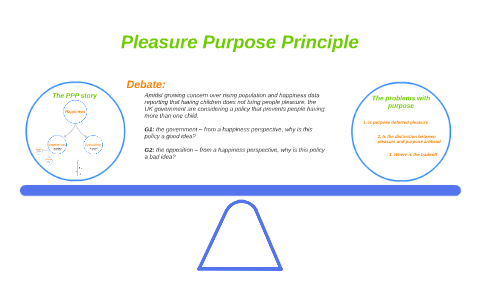The allure of the pleasure principle, a psychological concept rooted in the pursuit of immediate gratification and sensory enjoyment, often clouds the vision of individuals seeking deeper meaning and fulfillment in their lives. This philosophical approach, while inherently human, can engender a superficial existence, where transient pleasures supplant a more substantive purpose. In stark contrast, the Bahá’í teachings advocate a life imbued with intention and purpose, emphasizing the importance of contributing to the betterment of humanity and achieving spiritual growth. This article elucidates the core tenets of Bahá’í teachings that facilitate transcending the pleasure principle to embrace a life driven by purpose.
Understanding the Pleasure Principle
The pleasure principle posits that human beings are primarily motivated by the quest for pleasure and the avoidance of pain. However, this instinctual drive can lead to an existence characterized by hedonism and short-lived satisfaction. Bahá’í writings suggest that while seeking pleasure is intrinsic to the human experience, it should not be the sole compass guiding our actions. Instead, this framework encourages individuals to awaken to higher spiritual capacities, recognizing that deep fulfillment often arises from altruistic endeavors rather than personal indulgence.
Spiritual Maturity: Ascending Beyond the Material
Central to Bahá’í teachings is the notion of spiritual maturity—an essential step toward transcending the limitations imposed by the pleasure principle. Individuals are urged to develop a profound understanding of their inner selves, fostering attributes such as compassion, patience, and generosity. Spiritual maturity involves recognizing the interconnectedness of all humanity and embracing a worldview that values unity over individual satisfaction. As one cultivates these virtues, the allure of immediate gratification diminishes, revealing a more profound joy born from service to others.
Purposeful Living: The Cornerstone of Happiness
Bahá’í principles emphasize that fulfillment springs from engaging in purposeful living. When individuals align their actions with their values, they experience a sense of coherence that brings genuine happiness. Setting goals grounded in moral and ethical standards, such as contributing to the welfare of society or pursuing personal growth, creates a rich tapestry of meaning woven into daily life. This commitment to a purpose greater than oneself engenders resilience, allowing individuals to remain steadfast in the face of life’s inevitable challenges.
The Role of Service in Achieving Purpose
Service holds a preeminent place within Bahá’í philosophy. Acts of service not only benefit the recipient but also elevate the giver, creating a reciprocal dynamic of joy and fulfillment. Engaging in community development, supporting those in need, or nurturing the environment signifies a conscious effort to transcend the self-serving impulses often associated with the pleasure principle. Moreover, such acts of service foster a sense of belonging and connection, nurturing one’s own spirit while contributing to the collective good.
Transformative Aspects of Sacrifice
In the pursuit of purpose, sacrifice emerges as a transformative aspect within the Bahá’í framework. The willingness to forego immediate pleasures for the sake of higher ideals is a hallmark of spiritual development. This concept resonates deeply with the narratives found in Bahá’í history, where individuals have demonstrated remarkable dedication to the cause of humanity, often at great personal cost. Embracing sacrifice cultivates resilience, fortitude, and an enduring commitment to a purpose-driven life.
Community Building: A Collective Endeavor
In advancing the Bahá’í teachings, the importance of community cannot be overstated. A thriving community fosters an environment where individuals are inspired to transcend the pleasure principle collectively. Community-driven initiatives—be they educational programs, social justice movements, or environmental stewardship projects—serve as platforms for individuals to collaborate towards common objectives. These shared endeavors may yield profound connections among participants, reinforcing the significance of collective action in pursuing a greater purpose.
Spiritual Practices: Enhancing Purpose and Connection
Spiritual practices, such as prayer, meditation, and reflection, are crucial in honing one’s ability to live purposefully. These practices nurture a deeper connection with the divine and reinforce an individual’s commitment to their higher calling. Through regular engagement in spiritual reflection, one gains clarity and direction, which in turn empowers them to navigate the distractions of the pleasure principle. The act of reflecting on one’s values and aspirations solidifies the intention to lead a life characterized by meaningful contributions rather than fleeting pleasures.
Living in Alignment with Divine Principles
Bahá’í writings exhort followers to live in alignment with divine principles—those immutable truths that govern existence. Such alignment fosters not only individual purpose but also the overarching goal of unity and peace among humanity. By recognizing the intrinsic worth of all human beings and advocating for justice and equality, individuals move beyond the confines of self-interest, influencing positive change in the world around them. This alignment is vital in transcending the pleasure principle, for true contentment arises when one’s actions harmonize with higher moral directives.
Conclusion: Embracing a Purpose-filled Existence
Transitioning from a life centered on the pleasure principle to one defined by purpose requires a conscious effort, deep introspection, and a commitment to service. The Bahá’í teachings provide a robust framework that encourages individuals to transcend fleeting desires in favor of lasting fulfillment found in love, unity, and altruism. By integrating these principles into daily life, one can embark on a profound journey, illuminating the path toward a richer, more meaningful existence anchored in a commitment to humanity and the common good. In this transformative process, the quest for purpose becomes not only an individual ambition but a collective endeavor that uplifts society at large.
